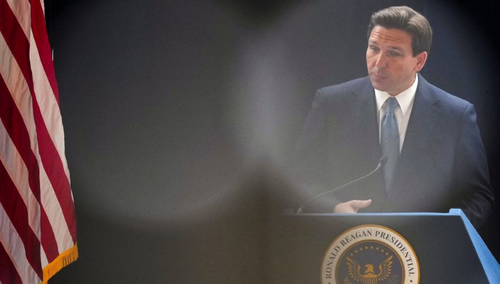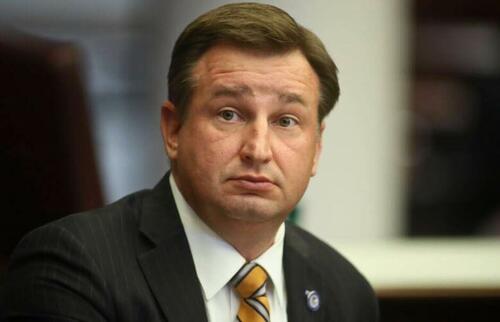
Update (1845ET): During his “State of the State” news conference Tuesday, Florida Governor Ron DeSantis denounced state Sen. Jason Brodeur’s bill, which would require bloggers to register with the state.
As the New York Post reports, DeSantis distanced himself from his fellow Republican’s proposal, saying it was “not anything I’ve ever supported," while adding that “I don’t control every single bill that has been filed.”
BREAKING— @GovRonDeSantis just struck down the 'Blogger Bill' that forces Bloggers to Register With State
— Javier Manjarres (@JavManjarres) March 7, 2023
READ MORE https://t.co/bsC2wfxhht#FlPol #Florida pic.twitter.com/HbQ4gTM9Oh
As The Daily Caller reports, DeSantis isn’t the first prominent GOP figure to condemn the blogger registration bill. Former Speaker of the House Newt Gingrich took to his personal Twitter account to disavow the bill, going a step further than DeSantis by admonishing Brodeur.
“It is an embarrassment that it is a Republican state legislator in Florida who introduced a bill to that effect. He should withdraw it immediately,” Gingrich wrote.
* * *
As Jonathan Turley detailed earlier, there is a deeply disturbing legislative proposal in Florida where Sen. Jason Brodeur of Lake Mary has called for bloggers to register with the state if they want to write about the state’s governor, lieutenant governor, cabinet members or legislative officials.
It is a highly intrusive, dangerous, and presumptively unconstitutional effort. Yet, it is also important to note that this is just a proposal from a single legislator with little real chance of passage. What I find interesting is the historical underpinnings of such a law. The comparison is not favorable for Sen. Brodeur.
The bill would require bloggers to file periodic reports with the state if they are paid for posts about the state’s governor, lieutenant governor, cabinet members or legislative officials. They could be fined $25 for each day the report is late, up to a maximum of $2,500 for each report. The legislation would exempt content on “the website of a newspaper or other similar publication.”
It is a vague and unnecessary law. In a Twitter post, Brodeur explained that he simply wants to bring greater transparency to blogs that advocate or lobby for specific causes. He notes that it is directed at those who are paid to write about elected officials in Florida.
In fairness to Sen. Brodeur, there are requirements for media to obtain press credentials to get full access to press areas in the federal or state capitals. However, the requirements are minimal and press can always cover events without such credentials by using public access.
Moreover, bloggers cover a wide range of speech and speakers. Blogs are part of the new media with a wide array of people covering or opining on contemporary events. It can range from the popular “citizen journalist” to minor “influencers” to satirical writers. Many blogs are now quite large and rival traditional newspapers or media outlets. They are a new and critical component in our free speech community. Many look to blogs as an alternative to what they see as a biased mainstream media.
I understand Brodeur’s motivation and his concern for bloggers who hide paid agendas or serve as surrogates for others. However, this is a really bad idea and it is not a new idea.
At the creation of our Republic, free press advocates like Thomas Paine were focused on state licensing laws that were abused in England by the Crown to control the media.
The licensing laws became a rallying cause in 1644 for many after John Milton wrote his famous pamphlet Areopagitica. Milton objected to the requirement of prior licensing of writers with the Crown, objecting that “debtors and delinquents may walk abroad without a keeper, but unoffensive books must not stir forth without a visible jailer in their title.” The licensing law ended in 1694. It was a defining moment of press freedom in fighting the need to secure permission to publish. Figures like Thomas Paine wrote against prior restraints and licensing systems as the core threats to free speech and the free press.
The Florida proposal would return us to mandatory licensing or registry as a prerequisite for free speech or the free press. I have no reason to assume that Sen. Brodeur has nefarious or authoritarian motives in this ill-conceived effort. However, he is on the wrong side of history in proposing a registry and should withdraw his bill.
Update (1845ET): During his “State of the State” news conference Tuesday, Florida Governor Ron DeSantis denounced state Sen. Jason Brodeur’s bill, which would require bloggers to register with the state.
As the New York Post reports, DeSantis distanced himself from his fellow Republican’s proposal, saying it was “not anything I’ve ever supported,” while adding that “I don’t control every single bill that has been filed.”
BREAKING— @GovRonDeSantis just struck down the ‘Blogger Bill’ that forces Bloggers to Register With State
READ MORE https://t.co/bsC2wfxhht#FlPol #Florida pic.twitter.com/HbQ4gTM9Oh
— Javier Manjarres (@JavManjarres) March 7, 2023
As The Daily Caller reports, DeSantis isn’t the first prominent GOP figure to condemn the blogger registration bill. Former Speaker of the House Newt Gingrich took to his personal Twitter account to disavow the bill, going a step further than DeSantis by admonishing Brodeur.
“It is an embarrassment that it is a Republican state legislator in Florida who introduced a bill to that effect. He should withdraw it immediately,” Gingrich wrote.
* * *
As Jonathan Turley detailed earlier, there is a deeply disturbing legislative proposal in Florida where Sen. Jason Brodeur of Lake Mary has called for bloggers to register with the state if they want to write about the state’s governor, lieutenant governor, cabinet members or legislative officials.
It is a highly intrusive, dangerous, and presumptively unconstitutional effort. Yet, it is also important to note that this is just a proposal from a single legislator with little real chance of passage. What I find interesting is the historical underpinnings of such a law. The comparison is not favorable for Sen. Brodeur.
The bill would require bloggers to file periodic reports with the state if they are paid for posts about the state’s governor, lieutenant governor, cabinet members or legislative officials. They could be fined $25 for each day the report is late, up to a maximum of $2,500 for each report. The legislation would exempt content on “the website of a newspaper or other similar publication.”
It is a vague and unnecessary law. In a Twitter post, Brodeur explained that he simply wants to bring greater transparency to blogs that advocate or lobby for specific causes. He notes that it is directed at those who are paid to write about elected officials in Florida.
In fairness to Sen. Brodeur, there are requirements for media to obtain press credentials to get full access to press areas in the federal or state capitals. However, the requirements are minimal and press can always cover events without such credentials by using public access.
Moreover, bloggers cover a wide range of speech and speakers. Blogs are part of the new media with a wide array of people covering or opining on contemporary events. It can range from the popular “citizen journalist” to minor “influencers” to satirical writers. Many blogs are now quite large and rival traditional newspapers or media outlets. They are a new and critical component in our free speech community. Many look to blogs as an alternative to what they see as a biased mainstream media.
I understand Brodeur’s motivation and his concern for bloggers who hide paid agendas or serve as surrogates for others. However, this is a really bad idea and it is not a new idea.
At the creation of our Republic, free press advocates like Thomas Paine were focused on state licensing laws that were abused in England by the Crown to control the media.
The licensing laws became a rallying cause in 1644 for many after John Milton wrote his famous pamphlet Areopagitica. Milton objected to the requirement of prior licensing of writers with the Crown, objecting that “debtors and delinquents may walk abroad without a keeper, but unoffensive books must not stir forth without a visible jailer in their title.” The licensing law ended in 1694. It was a defining moment of press freedom in fighting the need to secure permission to publish. Figures like Thomas Paine wrote against prior restraints and licensing systems as the core threats to free speech and the free press.
The Florida proposal would return us to mandatory licensing or registry as a prerequisite for free speech or the free press. I have no reason to assume that Sen. Brodeur has nefarious or authoritarian motives in this ill-conceived effort. However, he is on the wrong side of history in proposing a registry and should withdraw his bill.
Loading…







